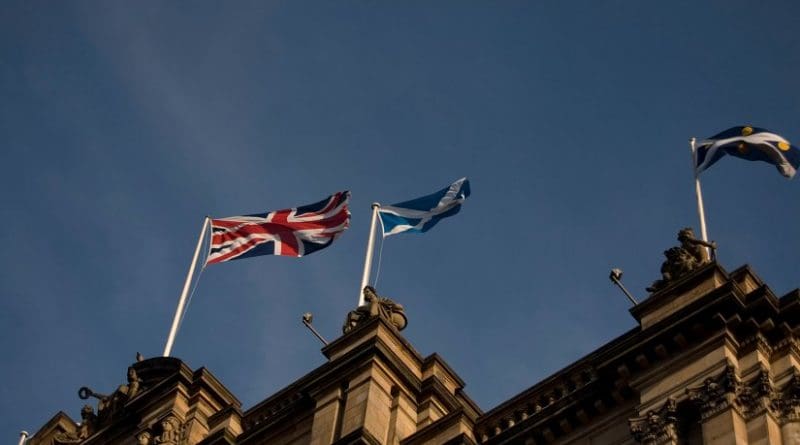English Nationalism, Murdoch And The Lowest Human Instincts – OpEd
By Arab News
By Neil Berry
Bringing together white Britons with a scattering of blacks, Asians, gays and Jews, the English Defense League (EDL) proclaims itself anti-racist, but few can doubt that what this burgeoning protest movement chiefly stands for is hatred of Islam, the racist belief that Muslims are undermining the British, or more specifically English, way of life.
On July 9, the latter-day crusaders who compose the EDL are marching in the English towns of Cambridge, Plymouth, Halifax and Middlesbrough. The last time they protested was in February, in the heavily Muslim town of Luton, where, in 2009, Muslim extremists outraged public opinion by demonstrating against a British regiment that paraded though the town after returning from Iraq.
On the same weekend, the leader of Britain’s Conservative-Liberal Democrat Coalition government, Prime Minister David Cameron, was giving a speech in Munich on national security. Though he had earlier deplored the EDL, he spoke in terms that could be interpreted as supportive of its attitude toward Islam. To the dismay of Liberal Democrat colleagues, Cameron averred that successive British governments had effectively licensed Muslims to pursue their own separatist agenda. His message was that Britain’s espousal of “multiculturalism” had led to Muslim alienation that in turn led to the 7/7 London bombings of 2005.
Barely had Cameron finished speaking than the EDL was boasting on Facebook that it was now the voice of the nation, a group with whose aims the British prime minister himself was proud to be identified.
Unlike the far-right British National Party, the EDL is not campaigning on the platform that immigrants are stealing British jobs. All the same, it is being fed by Britain’s economic problems and by rampant unemployment among young people. It is perhaps precisely because it defines itself not in relation to unemployment but to a nebulous threat to English identity posed by Muslims that it is becoming a magnet for young people who feel embittered and betrayed.
It is not hard to see why Cameron might be tempted to endear himself to EDL supporters as he attempts to implement punitive austerity measures. Yet by indulging paranoid popular feelings that Muslims are the “enemy within,” the prime minister is playing with fire. The danger is that by associating himself with virulent English nationalism, he may be nurturing a monster, a quasi-fascist movement that could endanger the very fabric of British democracy.
The belief that Britain has been robbed of its identity is not, to be sure, without foundation. Nor is it in doubt that, on top of regional devolution, the fast-changing demography of Britain has thrown into sharp relief the whole question of what it means to be British. Yet if there is a crisis of Britishness or Englishness, it is hardly explained by the issues on which the EDL is fixated: after all, the majority of British Muslims are law-abiding and patriotic. Arguably, Britain’s identity crisis derives above all from the extent to which Britain has been turned into a diminutive version of the United States, with ruinous consequences in loss of social cohesion and the erosion of national autonomy.
From this point of view, nobody has visited more violence on the cultural integrity of Britain than the US-based Australian media baron, Rupert Murdoch, who has been close to being allowed to gain complete control of the media operation BSkyB and become the major force in the British media — despite the fact that his newspaper group, News International, already under criminal investigation for phone-hacking, is contending with vastly damaging new evidence that its Sunday newspaper, the News of the World, employed a private investigator to hack the phone of the murdered British school girl, Milly Dowler.
The raw, US-style free market capitalism championed by Murdoch has done much to make Britain what it is: a fragmented society of great social inequalities with an economy hugely reliant on migrant workers who, in contrast to indigenous Britons, are prepared take the low-paid jobs that are the main form of employment in Britain. It is true that Murdoch’s newspapers are facing extreme public opprobrium now that the phone-hacking scandal has extended to a brutally murdered teenager. Nevertheless, his coarse, sensation-mongering, belligerently nationalistic tabloid, the Sun, remains Britain’s best-selling daily newspaper and a mirror for England at its most brutish. In many ways, the English Defense League could be said to be the Sun taking to the streets.
Through the Sun, Murdoch has effectually exposed the British psyche to a view of the world that exalts self-seeking and materialism and makes much of celebrity and scandal while enshrining the essential beneficence of the United States, the special significance of Israel as a bastion of democracy in the Middle East and the threat to Western civilization posed by Islam. Indeed, it is safe to say that his newspapers’ exploitation of the mental impoverishment of the British working-class and their demonization of Muslims have increasingly gone hand in hand.
Among the political class, it has become an article of faith that no British party can hope to prosper without the backing of Murdoch’s newspapers. Such is his imperious sway over public life that for all practical purposes Murdoch himself has long been an unofficial member of the British Cabinet, irrespective of which party is in power. The point has even been reached where it can be reported that BSkyB’s summer party is being held in a major department of state, the British Foreign Office, without occasioning the least public comment.
Whatever the upshot of the phone-hacking scandal, Murdoch has bent Britain to his will to a humiliating degree. If the ugly, anti-Islamic nationalism of the English Defense League intensifies it will be in no small measure because for years British politicians have meekly capitulated to a megalomaniacal media mogul who specializes in pandering to the lowest human instincts.
— The author can be contacted at [email protected]

